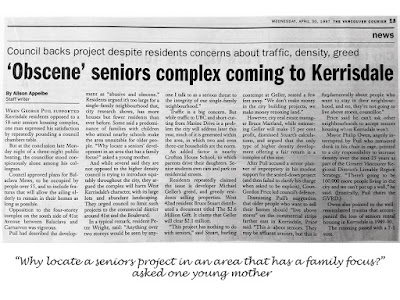 Should citizens be more empowered to decide what gets built and where in Vancouver?
Should citizens be more empowered to decide what gets built and where in Vancouver?Or is the process already too prone to public pressures, stifling the creativity and know-how and vision that professional planners are hired to provide?
These were the questions debated Wednesday night at the UBC Robson Square theatre. Speaking against the resolution Let Experts Plan were Charles Campbell and Michael Kluckner. Speaking for it were Judy Rudin and me. What is interesting about these debates is that the audience is invited to vote on their preferred position prior to the start of the debate, and then again at the end.
In this case about 56% of those in attendance were in favour at the start, and 58% were in favour at the end. The debate was filmed and will be soon be posted on the Urbanarium site www.urbanarium.org
While I prefer not to read presentation notes, I did prepare some slides, and notes as set out below:
 |
| Sadly it was reduced to 3 storeys at Public Hearing due to neighbourhood objections |
 |
| Today you can barely see the project, and virtually all the objectors have moved away |
 |
| And here's the obtrusive, obscene project today! |
 |
| One last case study in West Vancouver |
I’m delighted to be here, and will
tell you why I’m here in a moment.
I’m also delighted to have Judy as my debating partner. Not a planner; an engaged,
concerned thoughtful citizen, with considerable experience in community consultation,
whose opinions I have come to admire through her presence on Facebook and
Twitter.
Before I tell you why I am here, let me tell you where am I
coming from
(powerpoint presentation)
Now why I was invited to participate in this
debate?
Two years ago I wrote a Vancouver Courier column “Is it time to say goodbye to
the experts?”
So who are the “experts”? planners, architects, transportation
engineers, sustainability planners, etc.
Professionals
who are educated to see an issue within its broader context.
My column
was in response to
· Creation
by city of Vancouver of Citizens
Assembly (which
Charles will talk about)
·
Planitzen
article The Fall of Planning Expertise’ which describes how we seem to have lost respect for "experts" — those who have
knowledge and/or experience in a particular field — and replaced it with a kind
of "expertise egalitarianism" whereby everyone's opinion is given
equal weight.
In my
article I wrote that
In the face
of such conflicts, the author suggests planners should ask: Are the powers and politics now vested in "community
participation" undermining the planning profession?
Planners
receive a broad education and experience in a range of disciplines including
urban design, regulatory processes, technical modeling, economic analysis,
environmental issues, and how to engage with a community.
Armed with this knowledge, in
many instances they are
attacked for being arrogant and elitist for insisting they know something the
ordinary citizen does not.
Increasingly, residents believe their personal
opinions should trump not only the planner’s individual expertise, but the
collective expertise of the planning profession.
Most planners acknowledge that the community has every right to
participate in the planning process. However too
often they hear objections to proposals from neighbourhood residents who simply
do not like what is being proposed.
Objectors believe that should be sufficient justification for the City to reject the proposal or neighbourhood plan.
The situation is exacerbated
since there does not
appear to be any agreement on who should be the final authority on
decisions related to planning and development; the local residents or the
planning profession.
Or often in the case of Vancouver,
the City Manager’s office,
Mayor or Council?
I look forward to debating this
tonight with my colleagues on the stage.
Summary:
There’s no disagreement that neighbourhood residents should have
a say in terms of what happens in their neighbourhoods.
But they need to be informed, and
obliged to make decisions taking into account the broader public good.
Too
often citizens camouflage their objections….they talk about
protecting the environment or worrying about traffic and parking when they are really
concerned about people moving in who are ‘not their kind’, or the fear of reduced
property values
What happens when the citizens have
the final say?
Look at Vancouver today….we protect single family
neighbourhoods; we force development where people often don’t want to live….along
busy arterials, rather than one street off the busy arterials, etc.
Because we
too often let residents plan, those Dunbar residents who want to move into a
townhouse, have to leave Dunbar.
They move to White Rock, or Richmond or Langley, or UBC….Why? because the
Dunbar Vision, prepared by the residents, doesn’t really allow for townhouses
except for locations where they’re not likely to be built.
What are considered the best neighbourhoods in
Vancouver? The south shore of False Creek, Coal Harbour, North Shore of False
Creek, Champlain Heights….places created by planners and other experts, not
local residents.
Or places
like East Fraser Lands created by informed citizens aided by experts.
Conclusion
We should let the experts plan, but they should
take direction from neighbourhoods and exercise professional judgement.


















No comments:
Post a Comment